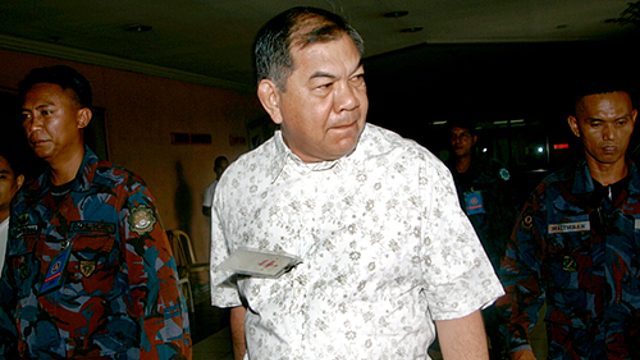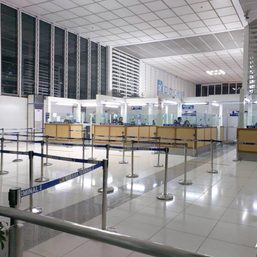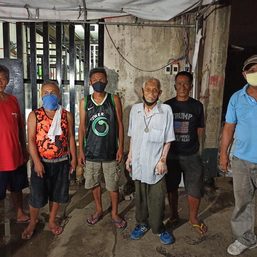SUMMARY
This is AI generated summarization, which may have errors. For context, always refer to the full article.

Seven years after halting the controversial plea bargain deal for retired Major General Carlos Garcia, the Supreme Court (SC) has lifted the deal’s temporary restraining order (TRO), greenlighting an agreement that could soon free the former military comptroller.
In a decision promulgated September 2020, but released only by the SC on Wednesday, June 2, the SC Third Division also lifted the TRO on the bail grant anti-graft court Sandiganbayan gave to Garcia.
“Considering the prosecution’s failure to prove private respondent Garcia’s guilt for plunder and money laundering beyond reasonable doubt, respondent Sandiganbayan cannot be said to have gravely abused its discretion in approving the assailed Plea Bargaining Agreement,” said the decision penned by Associate Justice Marvic Leonen, with concurrences from Associate Justices Rosmari Carandang, Rodil Zalameda, Mario Lopez, and Samuel Gaerlan.
Garcia is currently detained at the New Bilibid Prison to serve time for violations of articles of war, while the controversial 2010 plea deal remained pending, wherein he’d plead guilty to the lesser offense of direct bribery, as opposed to being tried for plunder.
Garcia was part of a big scandal involving alleged pabaons (farewell gifts) to retired generals, amid claims of corruption within the military.
When the Supreme Court issued the TRO in 2013, Garcia continued to be detained for the non-bailable charge of plunder, for which he could have been transferred to a detention facility instead of Bilibid, which is just for convicts. But he stayed in the national penitentiary.
Rappler has reached out to Sandiganbayan to ask what the anti-graft court would now do with this decision. We will update this story once the court responds.
A question is whether Garcia’s time in prison could be counted as service of sentence, seeing that direct bribery’s punishment is 6 to 12 years. There is also the question of what the effect of the lifting of the TRO on bail would be.
As it stands, Sandiganbayan is yet to promulgate judgments based on a plea deal. While there is no promulgation yet, Garcia is allowed to post bail.
The decision
The Supreme Court’s decision was largely based on the fact that the Office of the Solicitor General (OSG) cannot intervene in a plea deal already entered into by the Office of the Ombudsman, the body mandated by law to execute plea deals.
The story involves a volatile transition of government from Gloria Macapagal-Arroyo to Benigno “Noynoy” Aquino III, with the latter spending his first year in office obliterating the former’s actions to make good on a campaign promise to stop corruption.
Garcia’s sons were arrested in 2003 at a US airport for smuggling dollars, resulting in the plunder charge against him.
In the last stretch of the Arroyo administration, in March 2010, former Ombudsman Merceditas Gutierrez approved the plea bargain deal.
The Sandiganbayan allowed Garcia to post bail for the lesser crimes. (Plunder is non-bailable.)
In December 2010, already under Aquino’s term, the OSG, helmed at the time by Solicitor General Jose Anselmo Cadiz, tried to intervene, saying the plea deal was very lopsided.
In May 2011, Gutierrez resigned. Her replacement, former Ombudsman Conchita Carpio Morales, opposed the deal, but during a clarificatory hearing by the Sandiganbayan, lawyer Christian Uy of the Ombudsman panel said Morales’ position paper is her view alone and just “food for thought,” according to court records.
With that, the Sandiganbayan went ahead with the plea deal. This was during a tense period in the Sandiganbayan involving the 2nd Division, which now Ombudsman Samuel Martires was part of. The Garcia plea deal continued to haunt Martires through his career.
With Sandiganbayan going ahead, the OSG under retired justice Francis Jardeleza went to the Supreme Court in June 2013, citing among others lack of consent from the Armed Forces of the Philippines (AFP).
A month after in July, the SC issued the TRO that kept Garcia in prison. He was already in Bilibid serving time for violation of articles of war, and preferred to stay there instead of a detention facility, saying he didn’t want to leave the reformational activities.
No grave abuse of discretion
In this recent decision, the SC said the OSG cannot represent the government, because it’s the Office of the Ombudsman that has the discretion to enter into plea deals.
“The government was already rightfully represented by the Office of the Ombudsman in the plunder case before the Sandiganbayan. Thus, the Office of the Solicitor General overstepped its bounds by insisting on providing additional representation,” said the decision.
“The prosecutorial discretion inherent in a plea bargaining agreement is further emphasized in Rule 118, Section l(a) of the Revised Rules of Criminal Procedure which mandates courts, including the Sandiganbayan, to consider plea bargaining during pre-trial,” said the decision.
The SC said it wouldn’t “interfere with the substance of or the wisdom behind the Plea Bargaining Agreement, as that falls squarely within the Office of the Ombudsman’s mandate of investigating and prosecuting erring government employees.”
“The Plea Bargaining Agreement appears to be procedurally sound; thus, the only remaining issue is if the prosecution was able to prove respondent Garcia’s guilt for plunder and money laundering beyond reasonable doubt, thereby rendering the Plea Bargaining Agreement unnecessary,” said the decision.
But the SC said there was no proof of ill-gotten wealth that could amount to P50 million, which is the threshold for what could be considered as plunder.
“Even [former audit commissioner Heidi] Mendoza’s testimony over the missing funds of the Armed Forces of the Philippines could not be directly attributed to private respondent Garcia’s misuse,” said the decision. – Rappler.com
Add a comment
How does this make you feel?





There are no comments yet. Add your comment to start the conversation.